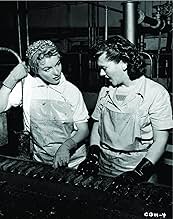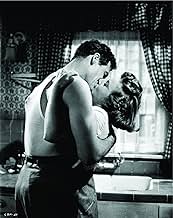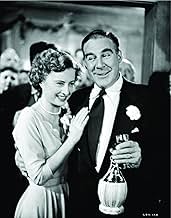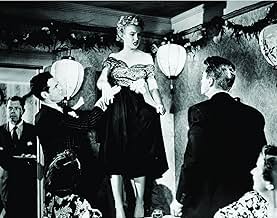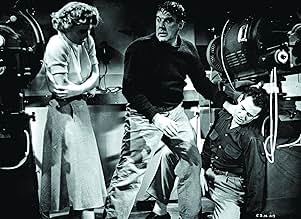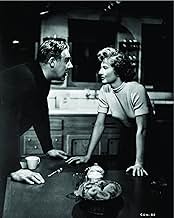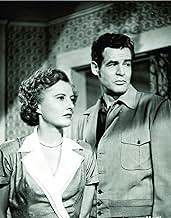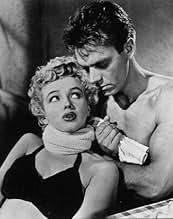AVALIAÇÃO DA IMDb
7,0/10
8 mil
SUA AVALIAÇÃO
Mae Doyle retorna à sua cidade natal como uma mulher cínica. Seu irmão Joe teme que sua amada, Peggy, funcionária da fábrica de conservas de peixe, possa acabar como Mae.Mae Doyle retorna à sua cidade natal como uma mulher cínica. Seu irmão Joe teme que sua amada, Peggy, funcionária da fábrica de conservas de peixe, possa acabar como Mae.Mae Doyle retorna à sua cidade natal como uma mulher cínica. Seu irmão Joe teme que sua amada, Peggy, funcionária da fábrica de conservas de peixe, possa acabar como Mae.
- Direção
- Roteiristas
- Artistas
- Prêmios
- 3 vitórias no total
William Bailey
- Waiter
- (não creditado)
Harry Baum
- Restaurant Patron
- (não creditado)
Dan Bernaducci
- Guest
- (não creditado)
Albert Cavens
- Restaurant Patron
- (não creditado)
Dick Cherney
- Fisherman
- (não creditado)
Charles Cirillo
- Restaurant Patron
- (não creditado)
Irene Crosby
- Guest
- (não creditado)
Russell Custer
- Fisherman
- (não creditado)
Tony Dante
- Fisherman
- (não creditado)
Roy Darmour
- Man
- (não creditado)
- Direção
- Roteiristas
- Elenco e equipe completos
- Produção, bilheteria e muito mais no IMDbPro
Avaliações em destaque
The subheading in the IMDb page for "Clash by Night" calls this film noir. Many fans of the genre may be disappointed. It does have one of the great film noir directors in Fritz Lang and stars two of the genres foremost performers in Barbara Stanwyck(DOUBLE INDEMNITY) and Robert Ryan(The Set Up). However, the style is more romantic drama than film noir. It reminds me of the filmed plays by Elia Kazan like "A Streetcar Named Desire". It even has a character screaming a name out the window. I guess the crime element is missing here but I guess infidelity would fit. The dialogue is up to the standard you'd expect a luminary like Clifford Odets to create. I was unsure if I would agree with the way the film ended but the characterization and plot were so well done, I knew that the ending would not disappoint. I was right.
The bitter and cynical Mae Doyle (Barbara Stanwyck) returns to the fishing village where she was raised after deceptive loves and life in New York. She meets her brother, the fisherman Joe Doyle (Keith Andes), and he lodges her in his home. Mae is courted by Jerry D'Amato (Paul Douglas), a good and naive man that owns the boat where Joe works, and he introduces his brutal friend Earl Pfeiffer (Robert Ryan), who works as theater's projectionist and is cheated by his wife. She does not like Earl and his jokes, but Jerry considers him his friend and they frequently see each other. Mae decides to accept the proposal of Jerry and they get married and one year later they have a baby girl. When the wife of Earl leaves him, he becomes depressed and Mae, who is bored with her loveless marriage, has an affair with him.
"Clash by Night" is an unpleasant drama with a bitter story and a moralist conclusion, actually a minor film of Master Fritz Lang in his career in Hollywood. Barbara Stanwyck has another magnificent performance in the role of a woman hardened by her bad sentimental and life experiences in the big city that returns home due to the lack of option. There is one quote ("When you run out of places, home is all you have left") that defines her mood. Paul Douglas plays a good honest man that nurses his old father, helps his crook alcoholic uncle and accepts the past of Mae Doyle, giving her a second chance. Robert Ryan plays a despicable rude man and disloyal friend. The affair between Mae and Earl has no chemistry and is only sexual desire. Last but not the least, it is delightful to see Marilyn Monroe playing a silly character. My vote is seven.
Title (Brazil: "Só a Mulher Peca" ("Only the Woman Sins")
"Clash by Night" is an unpleasant drama with a bitter story and a moralist conclusion, actually a minor film of Master Fritz Lang in his career in Hollywood. Barbara Stanwyck has another magnificent performance in the role of a woman hardened by her bad sentimental and life experiences in the big city that returns home due to the lack of option. There is one quote ("When you run out of places, home is all you have left") that defines her mood. Paul Douglas plays a good honest man that nurses his old father, helps his crook alcoholic uncle and accepts the past of Mae Doyle, giving her a second chance. Robert Ryan plays a despicable rude man and disloyal friend. The affair between Mae and Earl has no chemistry and is only sexual desire. Last but not the least, it is delightful to see Marilyn Monroe playing a silly character. My vote is seven.
Title (Brazil: "Só a Mulher Peca" ("Only the Woman Sins")
CLASH BY NIGHT is a melodrama that betrays its stageplay origins with some artful but sometimes arty dialogue that attempts to get us beneath the skin of its three main characters--and occasionally does. But it's a tribute to the acting skill of Stanwyck, Paul Douglas and Robert Ryan that their characters come alive with all their flaws and longings exposed.
Barbara is excellent as a woman who returns to a fishing village after a long time away, a bitter, defeated woman still trying to find a niche for herself. Paul Douglas does a remarkably fine job as a good-hearted man, simplistic in nature, who latches onto her only to have her betray him with the lusty Robert Ryan. Lookers on include two very interesting performers--Keith Andes and Marilyn Monroe (on her way up). Andes breathes life into the role of Barbara's disgruntled brother and should have been groomed for stardom--he had the looks and appeal of a major star.
A somewhat downbeat ending resolves the conflict--but along the way there are some very high-strung moments from Stanwyck that she plays to perfection. Marilyn Monroe demonstrates talent in a minor role.
A bit talky and stagebound in some scenes--but an interesting melodrama thanks mainly to the gripping performances of Stanwyck, Douglas and Ryan. Ryan would have made a great Stanley Kowalski in 'Streetcar' based on his drunk scene in this one. He can play a brute about as well as anyone and here he's quite an actor, matching Stanwyck's intense performance with a sturdy one of his own.
Barbara is excellent as a woman who returns to a fishing village after a long time away, a bitter, defeated woman still trying to find a niche for herself. Paul Douglas does a remarkably fine job as a good-hearted man, simplistic in nature, who latches onto her only to have her betray him with the lusty Robert Ryan. Lookers on include two very interesting performers--Keith Andes and Marilyn Monroe (on her way up). Andes breathes life into the role of Barbara's disgruntled brother and should have been groomed for stardom--he had the looks and appeal of a major star.
A somewhat downbeat ending resolves the conflict--but along the way there are some very high-strung moments from Stanwyck that she plays to perfection. Marilyn Monroe demonstrates talent in a minor role.
A bit talky and stagebound in some scenes--but an interesting melodrama thanks mainly to the gripping performances of Stanwyck, Douglas and Ryan. Ryan would have made a great Stanley Kowalski in 'Streetcar' based on his drunk scene in this one. He can play a brute about as well as anyone and here he's quite an actor, matching Stanwyck's intense performance with a sturdy one of his own.
This Fritz Lang film has been largely ignored though in it's way it is as psychologically astute as many of his better known works such as "Scarlett Street". In transposing a Clifford Odets play from New York to a Californian fishing community some of the more florid dialogue seems unnaturally heightened but the performances of the three principals (Barbara Stanwyck, Robert Ryan and particularly Paul Douglas) are stunning and the emotional core of the film is so strong that an audience can feel bruised by what's on screen. The blue collar milieu is perfectly evoked, the black-and-white cinematography by Nicholas Musuraca is first-rate and even the score seems understated, adding to, rather than detracting from the dramatic effect. Essential viewing.
Far from vintage Fritz Lang, but still enjoyable in its high-strung melodramatic antics, accentuated in a needlessly symbolic way by the raging of the sea and the clouding over of the sky.
Tough girl Barbara Stanwyck returns to her hometown after ten years of being the mistress of a married man. "Home is where you come, when you run out of places", she says, characteristically". She meets and marries simple, goodhearted fisherman Paul Douglas, but is bored by ordinary married life: "Every day you get a little older, lonelier, stupider", and soon succumbs to her attraction to cynical, boozy movie projectionist Robert Ryan.
The power of 'Clash by Night' lies not in its trite plot or in its overblown imagery, but in the no-nonsense acting of Stanwyck and Ryan, tough as nails but raw at the core. They have an animal eroticism together between them that sparkles like fireworks, but they are also, alas, quite self-pitying.
Many of the bit parts are surprisingly unsavory, but then we also get the young Marilyn Monroe as the naive young girl who hopes to marry Stanwyck's hunky brother, played by Keith Andes, more often than not strutting his naked torso.
Tough girl Barbara Stanwyck returns to her hometown after ten years of being the mistress of a married man. "Home is where you come, when you run out of places", she says, characteristically". She meets and marries simple, goodhearted fisherman Paul Douglas, but is bored by ordinary married life: "Every day you get a little older, lonelier, stupider", and soon succumbs to her attraction to cynical, boozy movie projectionist Robert Ryan.
The power of 'Clash by Night' lies not in its trite plot or in its overblown imagery, but in the no-nonsense acting of Stanwyck and Ryan, tough as nails but raw at the core. They have an animal eroticism together between them that sparkles like fireworks, but they are also, alas, quite self-pitying.
Many of the bit parts are surprisingly unsavory, but then we also get the young Marilyn Monroe as the naive young girl who hopes to marry Stanwyck's hunky brother, played by Keith Andes, more often than not strutting his naked torso.
Você sabia?
- CuriosidadesThis movie was shot while Barbara Stanwyck was in the process of divorcing Robert Taylor. The movie also features the rising young star Marilyn Monroe. Barbara gives a good performance in one of her most memorable films. Despite her emotional devastation due to the divorce, the crew noted Stanwyck's lack of a diva tantrum. Fritz Lang later said, "She's fantastic, unbelievable, and I liked her tremendously. When Marilyn missed her lines - which she did constantly - Barbara never said a word."
- Erros de gravaçãoWhile at the tavern, Mae and Jerry watch the moon rise over the ocean. The film takes place in Monterey, California, which is on the West coast, where the moon rises over the hills and sets on the ocean.
- Cenas durante ou pós-créditosand introducing Keith Andes
- ConexõesEdited into Les Amoureux du cinéma (1987)
- Trilhas sonorasI Hear a Rhapsody
Written by George Fragos (uncredited), Jack Baker (uncredited) and Dick Gasparre (uncredited)
Sung by Tony Martin
Principais escolhas
Faça login para avaliar e ver a lista de recomendações personalizadas
- How long is Clash by Night?Fornecido pela Alexa
Detalhes
Bilheteria
- Faturamento bruto mundial
- US$ 62
- Tempo de duração
- 1 h 45 min(105 min)
- Cor
- Proporção
- 1.37 : 1
Contribua para esta página
Sugerir uma alteração ou adicionar conteúdo ausente


